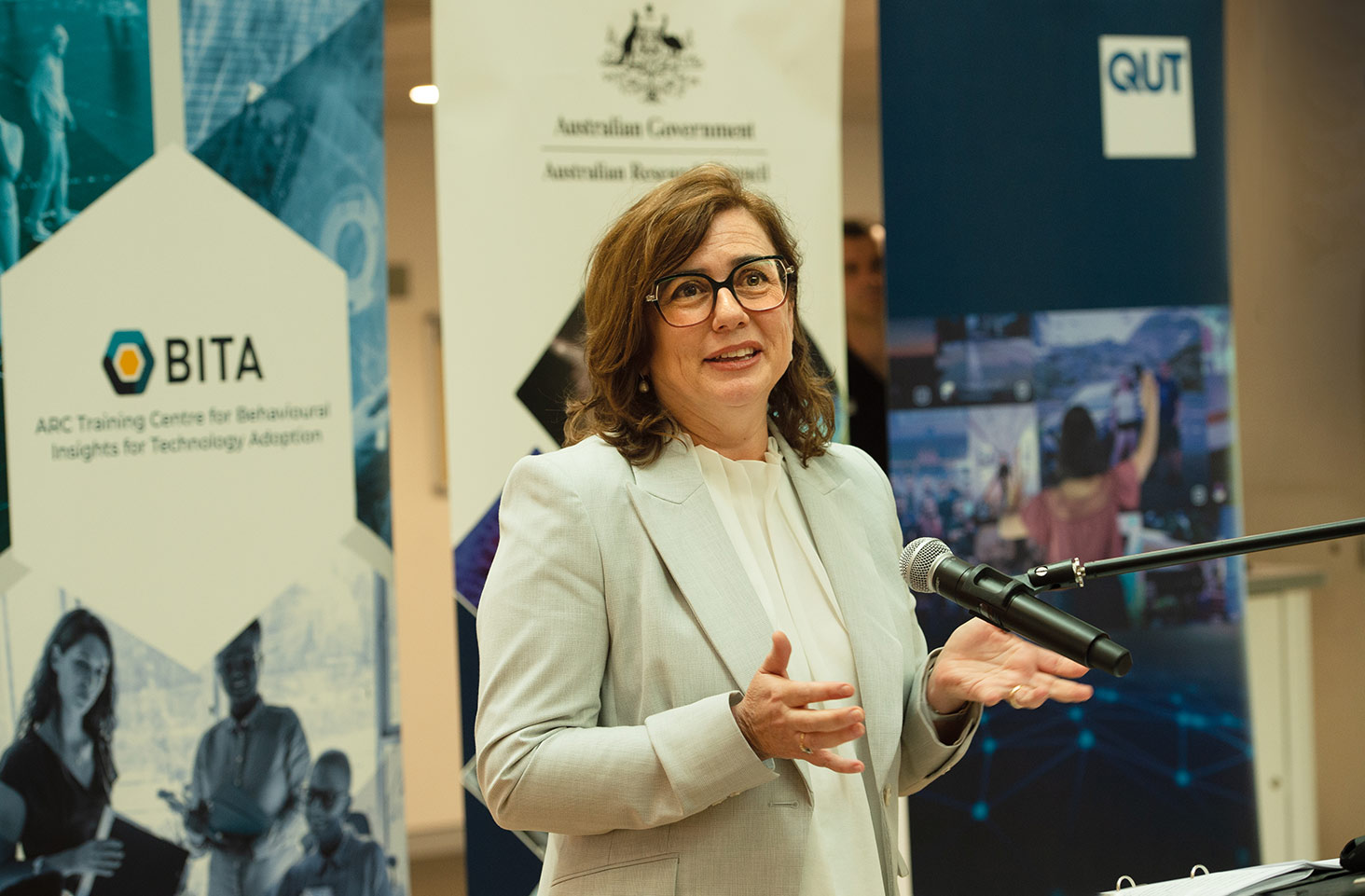A QUT-researcher led training centre, the $6.5 million Australian Research Council (ARC) Training Centre for Behavioural Insights for Technology Adoption (BITA), has officially opened today. (May 17).
The training centre aims to accelerate Australians' adoption of innovation technologies in health, agriculture and cybersecurity.
QUT Vice-Chancellor Professor Margaret Sheil said the launch of the BITA training centre highlights the vital role the centre will play in helping overcome the barriers to the adoption of innovation.
"I would like to acknowledge Professor Uwe Dulleck and his team and the remarkable work they have done, first with the Centre for Behavioural Economics (BEST) and now with the exciting launch of BITA," Professor Sheil said.
"The undeniable connection between both these centres is the foundation in collaboration and industry engagement across a platform of multi-disciplinary research."
"Behavioural Insights applied to innovation will ensure it is not squandered, or lost, and there is no time in Australia's history where this is more important," Professor Sheil said.
Professor Christina Twomey, ARC's Chief Research Officer for Queensland and QUT said the BITA Training Centre aims to understand and address the behavioural, economic, and financial barriers to Australia's adoption of innovation.
"As well as punching well above its weight in research, Australia is a country rich in technological innovation," said Professor Twomey.
"The BITA Training Centre recognises Australia's need to improve the adoption and widespread use of technological innovations, for stronger economic growth and prosperity."
ARC Training Centres and Research Hubs are funded under the ARC's Industrial Transformation Research Program. Training Centres such as BITA increase collaboration between Australia's most innovative researchers and vital industries.
"As a Training Centre, BITA will also support the creation of knowledge across organisational boundaries by building the capacity of students, researchers, and industry partners to foster innovation adoption," Professor Twomey said.

Centre Director QUT Professor Uwe Dulleck from the Centre for Behavioural Economics, Society and Technology (BEST) and QUT's School of Economics and Finance said the Training Centre involves researchers from QUT, The University of Western Australia and The University of Queensland.
The collaboration with Distinguished Professor Dietmar Hutmacher on additive biomanufacturing - 3D printing in the health context – illustrates how the centre's research would contribute to encourage people to engage with new medical procedures and implants for personalised medicine that meet individual person's needs.
"Similarly, work with Professor Gerald Holtmann, from the Princess Alexandra Hospital, will show how Behavioural Insights can improve health outcomes in Queensland's hospital system," Professor Dulleck said.
But research into barriers and enablers of innovation is not limited to health.
"In agriculture, too, we have new foods made from mung beans and chickpeas developed by Professor Sagadevan Mundree from the QUT Centre for Agriculture and Bioeconomy, for example, and engaging consumers and producers with these innovations is crucial to harvest the full benefits," Professor Dulleck said.
"There is also new time and cost-saving technology for production methods that have not had public uptake such as the 'smart paddock' which uses chips in animal ear tags to monitor the health of the herd and let the farmer know when the animals need more food or water."
Professor Dulleck said the Centre's research will also contribute to the understanding of trust in data that is available and how users engage with it.
"With the rapid growth of the digital economy we need innovation to provide greater cyber wellbeing."
"For example, we are working with Stryker, the global Med-Tech company, to look into questions of data governance and reliance and how this affects clinicians using new technologies to its full potential. We are also collaborating with KIAH Consulting, our Canberra based partner, to research sectors where misinformation and disinformation can affect large projects as well as individual projects," Professor Dulleck said.
"Combining perspectives from behavioural economics and economics with engineering and health is a powerful tool to understand how technical, economic, and behavioural solutions can help to overcome people's hesitancy to use novel products. Understanding the role of biases and heuristics in people's decision making often provides insights how to overcome this hesitancy."
"It's uncertainty about an innovation – maybe the new technology could be better, but you don't know what it is and whether you would succeed so you stick with the current technology," he said.
"We know that 'extension officers' – in agriculture, early adopters and influencers who can explain and demonstrate how new technology works and vouch for its reliability are needed to reduce ambiguity as well as practical barriers to access and cost of novel technologies, but little systematic research exists to take the role of behaviours of all the people involved into account."
The Training Centre's Associate Director of Research Training, Professor Rebekah Russell-Bennett, from QUT School of Advertising, Marketing & Public Relations will coordinate the research projects for postgraduate students.
"Our research partnerships with industry will give BITA students experience in developing research skills to address the real-world challenges we all face," Professor Russell-Bennett said.






